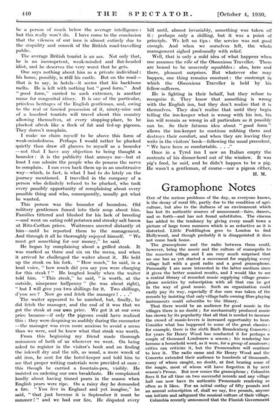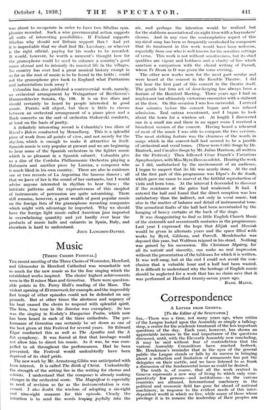Gramophone Notes
ONE of the serious problems of the day, as everyone knows, is the decay of rural life, partly due to the condition of agri- culture, but also to the dullness of an environment which has lost its authentic sources of amusement—fairs, dances, and so forth—and has not found substitutes. The cinema has added to the tendency by giving every small town a picture of large town manners which is as seductive as it is distorted. Little Puddlington goes to London to find Hollywood, and though probably it is disappointed it does not come back home.
The gramophone and the radio between them could, however, bring the music and the culture of cosmopolis to the remotest village and I am very much surprised that no one has as yet started a movement for supplying every village hall with a good radio and a good gramophone. Personally I am more interested in the latter medium since it gives the better musical results, and I would like to see a central library of recorded music supplying village gramo- phone societies by subscription with all that can be got in the way of good music. Such an organization could easily pay its way, especially if due care was taken of the records by insisting that only village halls owning fibre playing instruments could subscribe to the library.
That there would be an audience for good music in the villages there is no doubt ; for mechanically produced music has shown by its popularity that all that is needed to increase the crowd of music-lovers is increased opportunity to hear. Consider what has happened to some of the great classics : for example, there is the sixth Bach Brandenberg Concerto ; for years Sir Henry Wood has conducted it for perhaps a couple of thousand Londoners a season ; his 'rendering has become a household word, as it were, for a group of amateurs ; critics can criticize it, but the Promenaders will continue to love it. The radio came and Sir Henry Wood and the Concerto extended their audience to hundreds of thousands, many of whom caught, no doubt, at first hearing some of the magic, most of whom will have forgotten it by next season's Proms. But now comes the gramophone ; Columbia fixes it for all time on two successful records and any village hall can now have its authentic Promenade rendering as often as it likes. For an initial outlay of fifty pounds and an annUal subscription of, shall we say, five pounds, anyone can initiate and safeguard the musical culture of their village.
ColuMbia recently announced that the Finnish Government
was about to co-operate in order to have two Sibelius spit. phonies recorded. Such a wise governmental action suggests sill sorts of interesting possibilities. If Finland supports Sibelius why should not Britain support flax? And yet it is improbable that we shall find Mr. Lartsbury, or whoever is the right official, paying for his works to be recorded. It would,- however, be worth a moment's thought how far the gramophone could be used to enhance a country's good name abroad and to intensify its musical life in the villages. No country has ever had a great musical history except in so far as the root of music is to be found in the fields : could not the gramophone give back to England what Puritanism and industrialism took away ?
Columbia has also published a controversial work, namely, an orchestral arrangement by Weingartner of Beethoven's Ilanunerklavier Sonata, Op. 106. It is on five discs and Should certainly be heard by people interested in good music. Purists will object, but there is little to choose between an . orchestral arrangement of a piano piece and a Bach concerto on the sort of orchestra Stokowski conducts, at least on the basis of purity.
A definitely interesting record is Columbia's two discs of liavel's Bolero conducted by Menzelberg. This is a splendid piece of work from all points of view, and not merely for the rhythm, which is enough to make it attractive in itself. Spanish music is very popular at present and we are beginning to hear some of the Spanish orchestras in the lighter music which is so pleasant in a Spanish cabaret. Columbia give us a disc of the Cordoba Philharmonic Orchestra playing a Habanera and another piece by Luceria, a composer who is much liked in his own country. There are also in existence one or two records of La Argentina the famous dancer ; all that we bave of her is the sound of her castanets, but I would advise anyone interested in rhythm to hear these ; the intricate patterns and the expressiveness of this simplest of instruments of percussion are quite astonishing. There still remains, however, a great wealth of good popular music on the foreign lists of the gramophone recording companies which might with advantage be imported. Why we should have the foreign light music called 'American jazz imported in overwhehning quantity and yet hardly ever hear the products of music halls and cabarets in Spain, Italy, and -elsewhere is hard to understand.
JOHN LANGDON-DAVIES.





















































 Previous page
Previous page